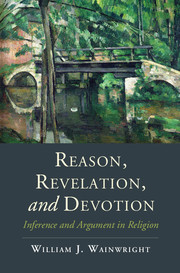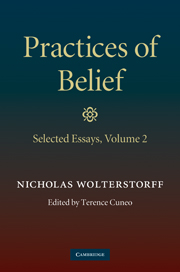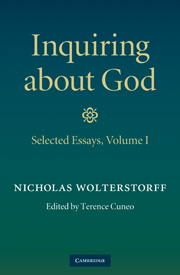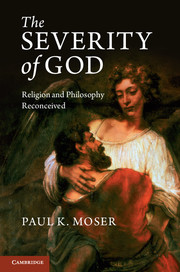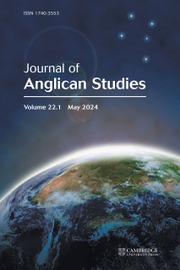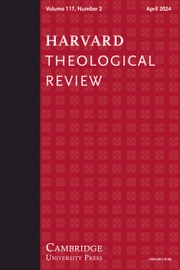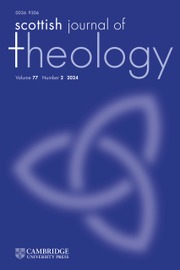Reason, Revelation, and Devotion
Inference and Argument in Religion
$65.00 (C)
Part of Cambridge Studies in Religion, Philosophy, and Society
- Author: William J. Wainwright, University of Wisconsin, Milwaukee
- Date Published: December 2015
- availability: Available
- format: Hardback
- isbn: 9781107062405
$
65.00
(C)
Hardback
Other available formats:
Paperback, eBook
Looking for an examination copy?
This title is not currently available for examination. However, if you are interested in the title for your course we can consider offering an examination copy. To register your interest please contact [email protected] providing details of the course you are teaching.
-
Reason, Revelation, and Devotion argues that immersion in religious reading traditions and their associated spiritual practices significantly shapes our emotions, desires, intuitions, and volitional commitments; these in turn affect our construction and assessments of arguments for religious conclusions. But far from distorting the reasoning process, these emotions and volitional and cognitive dispositions can be essential for sound reasoning on religious and other value-laden subject matters. And so western philosophy must rethink its traditional antagonism toward rhetoric. The book concludes with discussions of the implications of the earlier chapters for the relation between reason and revelation, and for the role that the concept of mystery should play in philosophy in general, and in the philosophy of religion and philosophical theology in particular.
Read more- Calls attention to the central role that extra logical factors play in the construction, deployment and assessment of religious arguments
- Examines the social, cultural, and historical contexts in which religious arguments are constructed and deployed with particular attention to Christianity and the religions of India
- Argues that immersion in religious reading and spiritual traditions produce emotions, feelings and intuitions that affect the construction and assessment of arguments for religious claims
Reviews & endorsements
"… Bill Wainwright has always been a person who philosophizes with his whole self. Little wonder, then if … he tries to show us how reasoning about what matters most is and ought to be existentially embedded. No surprise, when he makes his cross-cultural case that rational conviction depends not only on logical acumen but on disciplined passions and habits of the heart."
Marilyn McCord Adams, University of OxfordSee more reviews"Bill Wainwright's thought and writing, like [those] of all good philosophers, [are] careful, precise, and elegant. This collection … shows the importance of attending to the passional aspects of reasoning, and [the] difference that context makes to the success of argument. It's an important and beautiful book; it should be widely read."
Paul Griffiths, Duke Divinity School"Wainwright seeks to explain why argument and inference in matters religious typically fail to be universally persuasive … Written in lucid, accessible prose and drawing on prodigious scholarship, including a deep knowledge of Hindu and Buddhist as well as Christian and Jewish sources, this is a major contribution to the self-understanding of both philosophy and theology."
Merold Westphal, Distinguished Professor of Philosophy Emeritus, Fordham University"Wainwright's book is a game-changer … No longer should analytic philosophers be able to ignore, to the degree they do, Eastern religions. [This is] required reading for philosophers of religion."
Jerome Gellman, Ben-Gurion University of the Negev"By probing the importance of religious practice (scriptural ingestion, mystical insight, the apprehension of mystery) and of the structural significance of passion and rhetoric in religious argumentation, Wainwright reveals once more his own distinctive depths of spiritual insight as well as his accustomed philosophical clarity. This is an important, timely, and elegant monograph [that] deserve[s] wide discussion."
Sarah Coakley, Norris-Hulse Professor of Divinity, University of Cambridge'… this is an important and valuable book for those working at the intersection of philosophy, religious studies, and theology.' Robert MacSwain, Reading Religion
Customer reviews
Not yet reviewed
Be the first to review
Review was not posted due to profanity
×Product details
- Date Published: December 2015
- format: Hardback
- isbn: 9781107062405
- length: 216 pages
- dimensions: 235 x 156 x 16 mm
- weight: 0.42kg
- availability: Available
Table of Contents
1. Four examples of religious reasoning
2. The purposes of argument and person-relativity of proofs
3. Religious reading and theological argument
4. Passional reasoning
5. The role of rhetoric in religious argumentation
6. Reason, revelation, and religious argumentation
7. Theology and mystery.
Sorry, this resource is locked
Please register or sign in to request access. If you are having problems accessing these resources please email [email protected]
Register Sign in» Proceed
You are now leaving the Cambridge University Press website. Your eBook purchase and download will be completed by our partner www.ebooks.com. Please see the permission section of the www.ebooks.com catalogue page for details of the print & copy limits on our eBooks.
Continue ×Are you sure you want to delete your account?
This cannot be undone.
Thank you for your feedback which will help us improve our service.
If you requested a response, we will make sure to get back to you shortly.
×
